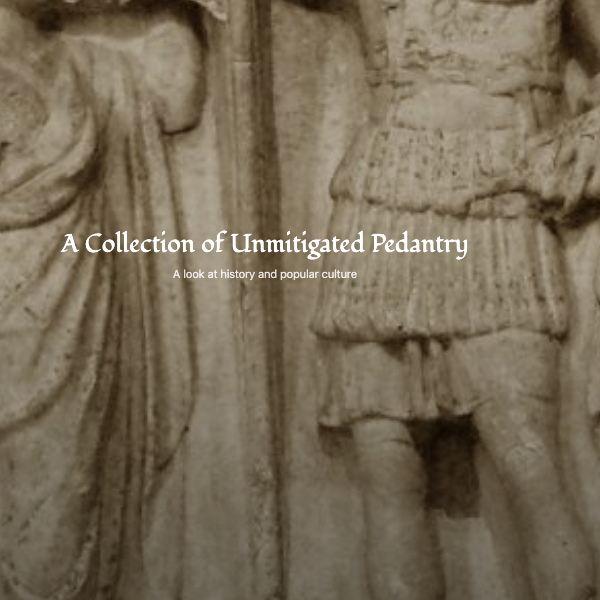A Collection of Unmitigated Pedantry: A Look at History and Popular Culture
A Collection of Unmitigated Pedantry: A Look at History and Popular Culture is a blog created by Dr. Bret C. Devereaux. Dr. Devereaux’s goal is to provide resources for incorporating popular culture into the classroom.
There are pages entitled Resources for Teachers, Resources for World-builders, a Book Recommendation list, and Guest Posts (this page still seems to be under construction at the time of this review). Each topic has its own header at the top of the site. On the sidebar, there are also tags that could be useful for searching for specific themes or keywords to pull up posts. The tags that have been used the most are also in a larger typeface to indicate higher frequency. Tags include common historical topics such as political history, social history, economy, middle ages, and more. But there are also non-standard topics, such as Game of Thrones, Lord of the Rings, gaming history, and video games, which could be used to find less traditional methods of teaching and including popular culture. For example, some of the Lord of the Rings posts/series analyze the strategy of characters in the movie to help students understand policy and militaristic choices. This could be engaging for students to translate to real-world events.
The page entitled “Resources for Teachers” consists of an index with links to posts that are especially helpful for K-12 teachers. Themes included are education in the humanities, the classics, pre-modern economies, ancient societies, religion, and military history. Many of the posts are from ‘series’ that tie together topics, for example, there is one on strategy in the Lord of the Rings, specifically ‘taking a historian’s look at the Battle of Helm’s Deep’ from both the books and the films. The resources would be more useful in a high school social studies classroom, and may not work well for younger students.
Other parts of the website have different uses. For example, Resources for World-Builders is a collection for writers seeking to build fictional worlds that still allow for historical rules to make sense, such as agricultural practices. This resource could still be useful for K-12 teachers focused on teaching creative writing. Fireside chat posts include personal information and thoughts from the author, but also musings related to the historian profession and practices, such as historians and objectivity, or the effects of peace on the military. However, the resources for world-building and the fireside chat posts may be of less use to history teachers. But, sorting through the website is relatively straightforward through the index system and the tags on the side.
The strength of this website comes from its nontraditional approach to teaching resources and topics. By combining historical popular culture with traditional analysis, teachers could include popular series, films, video games, and books in lesson plans with the assurance of accuracy while also engaging students who may struggle to care about history. The use of video games and gaming history is also at the forefront of history pedagogy incorporating digital methods and can be a good starting point for educators interested in its use. This website is more geared towards educators seeking to include popular culture and nontraditional teaching methods in the classroom to explore the ancient, classical, and medieval worlds. Those seeking to include these resources in their lesson plans will be pleased with this website and its collections.
